|
|
|
Sort Order |
|
|
|
Items / Page
|
|
|
|
|
|
|
| Srl | Item |
| 1 |
ID:
114010
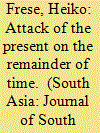

|
|
|
|
|
| Publication |
2012.
|
| Summary/Abstract |
Using the example of a local chronicle from early nineteenth-century Orissa, this article discusses the structure, content and strategy of selected historiographical texts of the period. Contemporary events and the immediate past can be identified in the texts and indeed govern their plots, reflecting a new representation of reality in historiography of this kind. Thus, the changing hegemonic order of such texts-where content begins to override form-mirrored the changing political world. Colonial discourse started to soak into Indian historiography.
|
|
|
|
|
|
|
|
|
|
|
|
|
|
|
|
| 2 |
ID:
114013
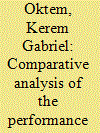

|
|
|
|
|
| Publication |
2012.
|
| Summary/Abstract |
This article compares the fortunes of the government coalitions under the leadership of the Communist Party of India (Marxist) or CPI(M) in Kerala, West Bengal and Tripura. The pattern of development and the success of the coalitions differ. In Kerala, the Left has lost every other election, whereas in West Bengal and Tripura, it has won many consecutive elections. West Bengal has seen stagnation in terms of human development, whereas Kerala and Tripura turned-to different degrees-into model states for human development. It is argued that the reasons for these different paths are to be found in the different strategies followed by the regional party units. Developmental success has been delivered through a mobilisation-based approach which has been followed inKerala and Tripura, but given up in West Bengal. This study explores thethree cases and elaborates on the reasons for the choice of strategies in the three states.
|
|
|
|
|
|
|
|
|
|
|
|
|
|
|
|
| 3 |
ID:
114011
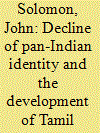

|
|
|
|
|
| Publication |
2012.
|
| Summary/Abstract |
This paper explores the rise and fall of pan-Indianism as the dominant identity narrative amongst the Indian diaspora in Singapore in the mid twentieth century, and its replacement with a normative Indian identity based primarily on Tamil culture. It will analyse some of the reasons why a Tamil cultural separatism came to dominate negotiations of ethnic identity in early post-war Singapore. This will include an examination of colonial ethnographic representations, the effects of demographic trends in Indian migration to Malaya during the colonial period, transnational political linkages between Singapore and India, and the effects of the Japanese occupation on Indian identity during World War II. The paper will also focus on the growth of the Tamil reform movement and the ways in which it came to shape the framing of Tamil ethnic identity in Singapore.
|
|
|
|
|
|
|
|
|
|
|
|
|
|
|
|
| 4 |
ID:
114016
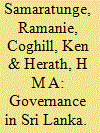

|
|
|
|
|
| Publication |
2012.
|
| Summary/Abstract |
This article applies complex evolving systems theory (CES) to investigating the governance factors affecting rebuilding in the wake of the 2004 tsunami in Sri Lanka. It also examines the crucial processes of co-operation between the various governance actors (public, market and civil society) in the aftermath of the disaster. The main focus is on the horizontal integration in the process of service delivery at the district level during the rebuilding stage, and on explaining the nature and extent of collaboration in the delivery of services needed for the survivors to build their new lives. Our observations suggest that influence, incentives and the power of dominant groups remain highly relevant to the outcomes and that the socio-political system within which they operate is dynamic. Governance as a whole has become a playing field for dominant stakeholder groups both within and outside the government. The study demonstrates the value of CES in improving the understanding of complex governance in the context of a crisis.
|
|
|
|
|
|
|
|
|
|
|
|
|
|
|
|
| 5 |
ID:
114012
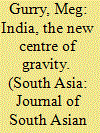

|
|
|
|
|
| Publication |
2012.
|
| Summary/Abstract |
Australia-India relations continue to puzzle foreign policy analysts. The reasons for stronger ties seem obvious, yet each successive Australian government has proved unable to forge the links necessary for more fruitful collaboration. Prime minister John Howard made two visits to India. His second visit in 2006-when he expressed unqualified enthusiasm for India's fast-growing economy and for the development of a new centre of gravity for the world, the emerging 'global middle class' of China and India-promised to change the language of engagement from neglect to partnership. This paper examines the context of the changing relationship, looks at the role of leadership in the formulation of foreign policy, and asks whether the momentum developed from Howard's visit was deep and strong enough to sustain the shocks ahead-the 2009 attacks on Indian students and the reversal of the decision on the sale of uranium-and to maintain a position for Australia in India's growing global engagement.
|
|
|
|
|
|
|
|
|
|
|
|
|
|
|
|
| 6 |
ID:
114018
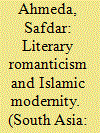

|
|
|
|
|
| Publication |
2012.
|
| Summary/Abstract |
In the nineteenth century, Muslim modernist reformers sought to ground an agenda for social and political rejuvenation in a return to the spirit of the early Muslim community. However, the influence of this quest for communal regeneration on theological discourses was, in some cases, less notable than its influence upon projects for cultural and social reform. One area of focus for Indian modernists of the nineteenth century was literature and the literary arts, including poetry, which were now deemed relevant to notions of cultural health, authenticity and decline. Under the dictum that a people's condition is reflected in their language, the themes of moral degeneration and reform came to have a strong bearing on the indigenous valuation of poetry and the literary arts, challenging the criteria upon which such literature was judged. In this paper, I will analyse how the modernist agenda for social reform led to the birth of a new literary romanticism in Urdu poetry.
|
|
|
|
|
|
|
|
|
|
|
|
|
|
|
|
| 7 |
ID:
114014
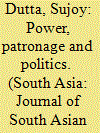

|
|
|
|
|
| Publication |
2012.
|
| Summary/Abstract |
This paper conceptualises the culture of corruption and clientelism in panchayat elections in Uttar Pradesh. The discussion is based on a year of field research on the strategies adopted by power-holders to monopolise these local bodies. The study found that patronage, influence and intimidation are used by the dominant factions to retain considerable control over the panchayats. While this in itself is not especially new, the study demonstrates the ways in which government initiatives to ensure greater transparency and representation of marginal groups-lower castes and women, in particular-through reservations continue to be cleverly subverted. A successful pradhan (headman) establishes a network of supporters and alliances, which he nurtures and rewards by brokering and embezzling funds through the institutions that he controls, instead of neutrally devolving funding to the needy sectors of the village.
|
|
|
|
|
|
|
|
|
|
|
|
|
|
|
|
| 8 |
ID:
114015
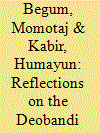

|
|
|
|
|
| Publication |
2012.
|
| Summary/Abstract |
During the British Raj, as part of an effort to reform the Muslim community through religious regeneration and in the absence of Muslim political power on the subcontinent, Islamic scholars (ulema) from the Darul Uloom Deoband seminary urged the setting up of separate institutions of religious education for Muslim women. The reformist discourse of the Deobandi ulema had, and still has, a profound influence on the pedagogy of madrasah education for women in South Asia, including Bangladesh. This study examines how Deobandi reformist ideals continue to be reflected in a non-government female madrasah in Bangladesh. The study provides an ethnographic account which illustrates the development of a sense of Muslim womanhood, rooted in ideas of moral guidance and the pious lifestyles of the female students of the madrasah. Madrasah education increases Muslim women's participation in religious institutions and forums, thereby heightening the possibility of a broader impact on religious life. Although madrasah education empowers female students to improve their religious consciousness, it has less impact on patriarchal ideology, which is deeply embedded in Bangladeshi society and culture.
|
|
|
|
|
|
|
|
|
|
|
|
|
|
|
|
| 9 |
ID:
114017
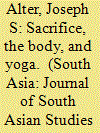

|
|
|
|
|
| Publication |
2012.
|
| Summary/Abstract |
In most general terms, hathayoga involves the internalisation and embodied literalisation of the Vedic fire sacrifice. Reflecting on the place of sacrifice in anthropological theory, and on the way in which sacrifice structures the relationship between humans and gods in terms of gift obligations, this paper explores the theoretical implications of hathayoga's embodied literalisation of a profoundly symbolic act. Although similar to various forms of ascetic renunciation, hathayoga is unique, it will be argued, in being structured as the physiological antithesis of religious ritual. Self-realisation based on the internalised yajna sacrifice undermines the binary structure of the sacred and the profane and makes god irrelevant. This raises theoretical questions concerning the social significance of a ritual that is anti-social on a number of different levels.
|
|
|
|
|
|
|
|
|
|
|
|
|
|
|
|
| 10 |
ID:
114019


|
|
|
|
|
| Publication |
2012.
|
| Summary/Abstract |
This paper investigates the sharp fall in the number of women workers in Indian coal mines, and explores the specificity of women workers in their demands for gender equity. It examines four main factors responsible for the gradual decline in women's participation in Indian collieries: the laws surrounding women's rights to work; the gendered impacts of technology use; the neglect of women workers' needs and interests by the relevant trade unions; and the gender discriminatory attitudes and instruments of the mining companies which have produced a certain kind of ideal worker who is also a gendered being. The paper asserts women's right to mine in order to earn a living, and to demand an equal share in the benefits that mining can offer.
|
|
|
|
|
|
|
|
|
|
|
|
|
|
|
|
| 11 |
ID:
114009
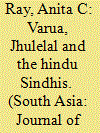

|
|
|
|
|
| Publication |
2012.
|
| Summary/Abstract |
The worship of Varua has persisted among the Hindu Sindhis for more than three and a half millennia. This paper enquires into the reasons for this deity's vitality and longevity, examining his representation in the earliest records of the Hindus and considering critical moments in his career-such as his manifestation as Jhulelal in the eleventh century and the resurgence in his worship after the Partition of India in 1947. The paper proposes that Varua's biography represents a long conversation between faith and cultures and that he has survived within the flow of history because the Hindu Sindhis have creatively preserved his quintessential attributes.
|
|
|
|
|
|
|
|
|
|
|
|
|
|
|
|
|
|
|
|
|